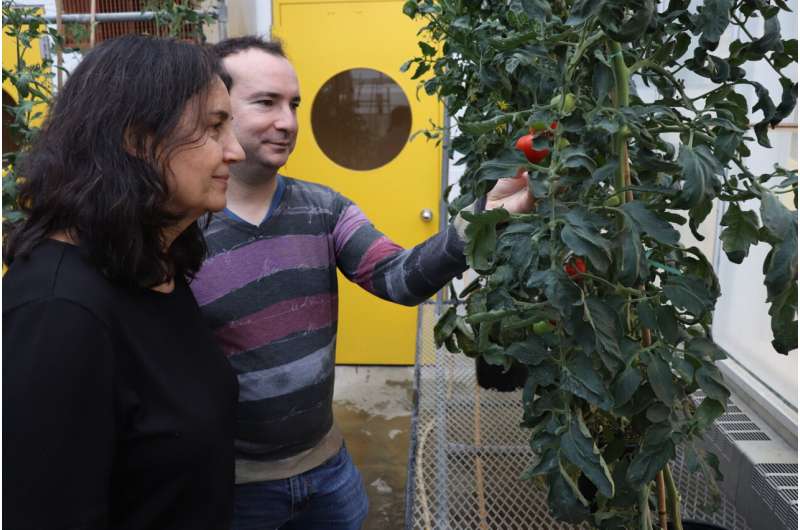This article has been reviewed according to Science X's editorial process and policies. Editors have highlighted the following attributes while ensuring the content's credibility:
fact-checked
peer-reviewed publication
trusted source
proofread
From ground-hugging to groundbreaking: How a unique tomato mutation could transform sustainable agriculture

Tomatoes are a staple in diets worldwide and an essential part of sustainable agriculture. Now, scientists at the Boyce Thompson Institute (BTI) have reported insights into a long-known tomato mutation, unlocking the potential for enhanced fruit quality and stress resistance.
"What started as curiosity about an intriguing mutant has blossomed into a potentially transformative discovery for sustainable agriculture," said lead researcher Carmen Catalá, an adjunct assistant professor at BTI and Senior Research Associate in the School of Integrative Plant Science at Cornell.
The investigation, published in the Journal of Experimental Botany, focused on decoding the mystery of a tomato mutant called "adpressa," first discovered in the 1950s. The mutant garnered attention because of an unusual characteristic: adpressa plants are unable to sense gravity. These plants often grow close to the ground rather than upward toward the sky; hence, their name conveys a habit of being flat (adpressed) against the soil.
The team led by Catalá, including BTI postdoctoral researchers Philippe Nicolas and Richard Pattison, began by uncovering the precise genetic change causing this fascinating effect. They found that the mutation blocks the synthesis of starch, which is a storage form of sugar.
The team pushed further, using the mutation to investigate fundamental questions about fruit biology. They discovered that the mutant shows major transcriptional and metabolic adjustments, including increased levels of soluble sugars and enhanced growth. More surprising was the discovery of complete resistance to blossom-end rot (BER), a physiological disorder causing deterioration of fruit's cell membranes and a dry, black, and sunken area on the bottom of the tomatoes.
Often noticed by gardeners and commercial growers, BER incidence is difficult to predict but has been directly related to environmental stresses such as temperature or irregular watering. BER also affects other fruits and vegetables, including peppers, squash, cucumber, and melon. Although this complex disorder has been intensively studied, mechanisms underlying BER development are not fully understood.
"Our findings with the adpressa mutant are quite promising. Contrary to what was previously thought, the lack of starch did not alter fruit development and ripening. In fact, adpressa fruits were slightly larger and accumulated more sugars during growth. The most remarkable discovery is the resistance to blossom-end rot. These findings open new avenues for improving fruit yield and quality, especially under stressful environmental conditions," noted Nicolas.
The research team at BTI collaborated with scientists from the Max Planck Institute in Germany, the Instituto de Hortofruticultura Subtropical y Mediterránea "La Mayora" in Málaga, Spain, and the US Department of Agriculture. Together, they utilized advanced genomic and metabolic analysis tools to study how the mutation affects fruit development.
"The intricate connection we observed between sugar metabolism and resistance to cellular damage in fruit tissues is particularly fascinating. This study reveals the potential for engineering or breeding tomatoes that can better withstand environmental challenges," said Nicolas.
The team is now working on understanding why these mutants are resilient against abiotic stresses and expect to find target genes or compounds with an essential role in BER resistance.
"We hope this discovery will lead to novel approaches in creating plants resistant to blossom-end rot and other types of stress-induced damage," said Catalá. "Not only would it benefit gardeners and commercial growers, but it would have a significant impact in countries with adverse growing conditions, where small farmers do not have the resources to protect their crops from environmental challenges such as drought."
More information: Philippe Nicolas et al, Starch deficiency in tomato causes transcriptional reprogramming that modulates fruit development, metabolism, and stress responses, Journal of Experimental Botany (2023). DOI: 10.1093/jxb/erad212
Journal information: Journal of Experimental Botany,
Provided by Boyce Thompson Institute



















